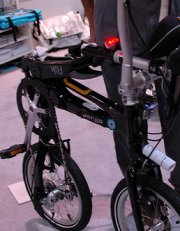[BikePortland managing editor Elly Blue is back from Interbike, but she’s still going through mountains of notes and photos. Below is a report of city/cargo/utility bikes she came across on the show floor. See the rest of our Interbike coverage here.]
For an Interbike rookie, the main floor of the show is quite overwhelming. But after the safe confines of the Advocacy Zone, I decided to delve out into the mayhem in search of the latest city bike offerings.
I was pleasantly surprised to find a fairly widespread interest in commute and utility biking. In fact, the very first booth I saw was Topeak’s, and the first thing I saw in the booth was a bike geared up for touring next to an ultra light tent, backed by a display of racks and baskets.

Behind Topeak was the booth of their subsidiary Jango, maker of modular commuter set-ups. Their big emphasis (a theme at Interbike this year) was the Flik folding bicycle, in various permutations. Everything on these bikes is interchangeable but proprietary — even the lights — but it’s an appealing bike. Its main function seems to not be making transit connections (it doesn’t fold up very small), but, as the salesman kept saying, to keep in your office in a place where there’s no bike parking available.
A couple booths over, Dahon was exhibiting their new line of Midtown Minis, with a similar appeal — they don’t fold small, and you need both hands and a tool, but they look and feel like regular bikes. Their “Smooth Hound” with its leather handlebar tape was especially appealing.
Racktime (a lower-priced version of Tubus, which is related to Ortlieb) had a lot of really nice and useful urban bags and panniers, and they were using gorgeous city bikes to display them.
Raleigh had a big booth with a wide range of bikes from carbon to cross to vintage-style. Brian Fornes told me that they are “going back to their roots” and really focusing on commuter bikes now — and they have a good looking one that comes with rack and fenders.
The European Village
At the European Village (a section in the far back corner for smaller, European vendors), I saw a lot of the things I’ve been looking for throughout the show, but haven’t always been finding even on commuter focused bikes: fenders, racks, integrated wheel locks, skirt guards, chain guards, generator lights, and thoughtful engineering for carrying heavy stuff around town.
Kalkhoff, the German e-bike maker who plans to open a retail store in NW Portland was also at Interbike. They told me that they’re still working on the permitting process, but are thinking their Portland store should open by mid-October. These bikes are neat — they have no throttle, and only give you an assist when pedaling. A cycle computer helps you balance your battery level against the level of assist you need. The floor model computers still showed km/hour — another kink they’re still working out as they jump into the US market.
One of my favorite booths was a small one in the back showing a handful of bikes from Dutch maker Gazelle. The Cabby is a bakfiets style kid carrier with a vinyl lined bucket instead of a wooden box. The kid seat comes out, and the whole bucket comes out for storage — the idea is it’s for people who don’t have a ton of space in their garage.
Gazelle’s other bike that I really liked was the Bloom (here’s a photo). It’s a bike designed specifically to have child seats added. The long-ish wheelbase lets you put a child seat a bit further back, and an extra long top tube (and extra long swept-back handlebars to compensate) also give you more room for a kid seat up front, between your arms. It’s a sturdy, nice looking bike.
The Gazelle’s working parts are “all sealed up, and maintenance free — they just let you do what you do, but without a car.”
I quickly fell for Pashley’s main display — a cargo bike with a huge basket up front, which is attached to the frame for easy steering. This is the company that makes the mail delivery bikes for the Royal Mail in the UK. They also had their bread-and-butter “Princess” model on hand — a classy black city bike with a skirt guard. Their new bike for this year is a stripped down model without many of the extra features, designed for affordability.
I had a hard time gauging the immense array of electric bike offerings, but there were a heartening number of electric-assist options (i.e., that help you only when you pedal) mixed in amongst more or less thinly disguised mopeds.
Despite a dizzying array of folding bikes (including electric folding bikes of course), another essential part of the urban transportation mix, there wasn’t much that was really new or exciting — most of the bikes just didn’t fold very small, and were marketed primarily for throwing into the trunk of your car.
There were also a number of bags and baskets, of varying degrees of more and less awesome. There were a few stroller-like kid trailers — including the Zigo, which we’ve written about before — but I only saw one display of cargo trailers.
Bike makers are definitely trying to woo commuters this year, and it’s refreshing to see how many are doing this with racks and fenders and useful panniers. But the industry still has a ways to go in crossing the barrier between design and function.





